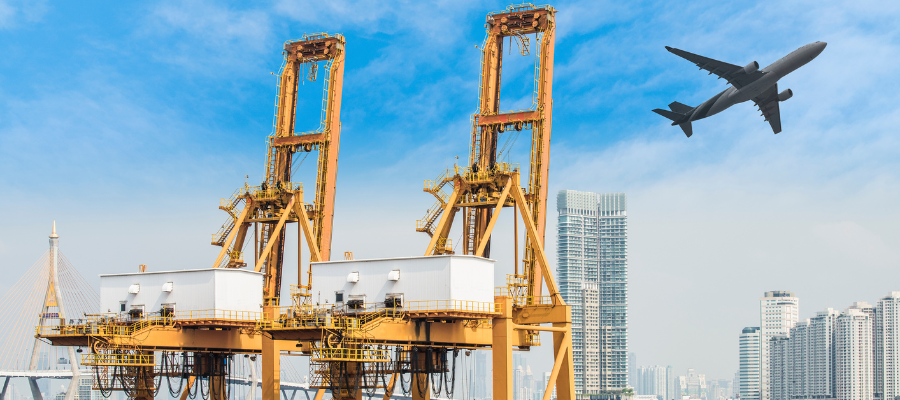🕒 Article read time: 2 minutes
Decarbonisation takes wing

While it is an integral part of global supply chains, air cargo is arguably also the most challenging of the transport modes to decarbonise.
As the economy faces rising fuel costs, Logistics UK is arguing that it is imperative that both government and industry recognise the vital role that Sustainable Aviation Fuel (SAF) can play in decarbonising aviation, and the action needed by both parties to scale production and distribute globally.
PAVING THE WAY FOR SUSTAINABLE AVIATION
The world’s first net zero transatlantic flight using solely SAF, flying from London Heathrow to New York’s John F Kennedy Airport, will pave the way for sustainable air travel. When fully replacing kerosene, it is estimated that SAF can reduce lifecycle carbon emissions by 70% compared to conventional fossil jet fuel. The use of 100% SAF on an air freight flight, combined with carbon removal through biochar credits – a material which traps and stores carbon taken from the atmosphere – will achieve a net zero flight and provide industry with sustainable air freight logistics.
AIR TRAVEL GOES ELECTRIC
Alongside advancements in SAF, the logistics sector expects to see an acceleration of e-fuel development, as being made from renewable energy sources e-fuels represent a major opportunity to decarbonise aviation. While it is seen as a suitable alternative and replacement to kerosene, there are concerns over the readiness of the biofuels used to produce SAF. Not restricted by such measures, the main issue surrounding e-fuels is that their production would require a huge amount of power. Most projects focus on electricity as the power source to manufacture e-fuels, with the sustainability of the fuel reliant on the power source used to produce it being from a renewable energy. Encouragingly, electric regional aviation is making great progress owing to ongoing advancements in battery technology. Projects spearheaded by NASA will take centre-stage as they continue to research and develop solid-state batteries, as opposed to lithium-ion batteries, in a bid to produce workable electric aircraft batteries.
GOVERNMENT MUST INCENTIVISE USE OF SAF
“With the exception that carbon offsetting and carbon capture and storage would be necessary to fulfil the 2050 target, aviation decarbonisation remains exceedingly challenging,” said Ellis Shelton, Policy Advisor, Logistics UK, “However, by promising to cut carbon emissions by 70%, government should take all reasonable steps to enhance the usage and accessibility of SAF, through both manufacturing and financial incentives.”
Not only will SAF be key in decarbonising aviation through lowering aircraft emissions, of which Logistics UK supports the SAF mandate of 10% by 2030, it has the potential to create a UK industry with an annual turnover of £2.4 billion by 2040, and which supports up to 5,200 UK jobs by 2035.
Shelton said: “Outside factors needing to be taken into consideration for decarbonising air cargo alongside fuel and emissions include the procedures before and after a cargo aircraft takes flight, constructing more environmentally friendly warehouses, placing solar panels on every roof, utilising electric forklifts and vehicles, and using recycled pallets to transport goods.”
DECARBONISING AIRPORT OPERATIONS
As part of the UK’s Jet Zero policy, which was introduced in July 2022 and sets out a strategy for how the nation’s aviation sector will attain net-zero emissions by 2050, there is an ambitious goal for all airport operations in England to be zero emission by 2040. Government has launched a consultation asking industry how best to achieve these zero emission airports whilst still reaping the benefits of the aviation sector.
Championing policies that aim to create a sustainable air freight sector, Logistics UK supports the Department for Transport’s Call for Evidence, focusing on the decarbonisation of airport operations. A zero emissions target for 2040 represents a sector supporting the UK’s Jet Zero goals, and a sector committed to achieving net-zero operations in 2050.
“Logistics UK encourages operators within the sector to provide their viewpoint in the call for evidence on how the UK government may accomplish its 2040 deadline,” Shelton concluded, “This integration of the aviation sector into the decarbonisation process is crucial, as its long-term and sustainable future will be shaped by the whole industry.”
*www.logistics.org.uk/air
Published On: 30/03/2023 16:00:28

Comments Section
If you are a Logistics UK member login to add comments.